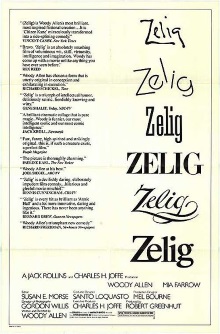
If you read through accounts of the career of Woody Allen, you don’t often see mentions of Zelig. That’s why it took a recommendation from our cinephile friend for me to take note of it. Partially because this is a mockumentary, this is one of the most unusual films I’ve ever watched. It’s also a film that is very much unlike anything else Allen was made, which might explain why it doesn’t get talked about much.
This film takes the form of a documentary, made sometime during the 1980s, about the story of an unusual man who becomes famous in the 1920s to the 1930s. That man is Leonard Zelig, a quiet and unassuming man who is played by Allen himself. After a series of odd events, it is discovered that Zelig is a human chameleon: he has the power to both physically and mentally change himself to match whoever he is interacting with. So if he’s in an Irish bar for example, he would inexplicably turn red and speak with an Irish accent. The theory goes that Zelig craves the security of conforming with the majority and blending in anonymously so much that he has developed this unusual ability. This makes him an instant celebrity and star carnival attraction. One psychiatrist however, Eudora Fletcher as played by Mia Farrow, makes it her life’s work to cure him of his condition.
Allen’s performance here takes a back seat to the numerous commentators who are interviewed for the documentary about his character. He mainly appears in the background and has relatively few lines. That many of these commentators are famous names in academic and literary circles, including Susan Sontag and Saul Bellow, lends these fake interviews heft and respectability. I was also astounded by the lengths that they went to in order to foster the illusion that Zelig was a real person. There are dolls and other toys based on Zelig, ostensibly to capture how much of a craze he caused in that time and even catchy songs written in the appropriate style about him. Most impressive of these is the song Chameleon Days, sung by Mae Questel who is better known as the voice of the cartoon character Betty Boop. All of this creates a weird sense of alternative history in the viewer, as if you have just uncovered some shadowy, long forgotten facet of the world.
Allen also employs a trick that will be familiar to anyone who has seen Forrest Gump. He splices in shots of himself as Zelig with vintage footage to show him interacting with famous historical figures. The wonder of it is that he did it nearly ten years before Robert Zemeckis and without the assistance of digital technology. This apparently require an immense amount of work but it pays off wonderfully: it adds to the illusion that all this was real and evokes the fast changing times of the roaring 20s. Since all this is about the other characters reacting to Zelig while he remains more or less a passive character, it doesn’t have the kind of cutesy sentimentality of Forrest Gump either.
This sort of distance between Zelig and the audience does mean that our emotions are never quite roused by his condition. What’s left is a quirky and sometimes rather clever commentary on society. There’s obviously the theme of the fleetingness and arbitrariness of not just fame but societal fads. That society as a whole is every once in a while swept by a sudden fad that seems to come out of nowhere but is then just as quickly forgotten. But the idea that a person who does everything that he can to conform to whatever company he finds himself in is ultimately no one at all is the most interesting. My favorite scene is the one in which Fletcher tricks Zelig that she’s an impersonator herself and he becomes confused about who he is supposed to be. I also like to think of the film as an interesting experiment, if not an altogether successful one, in generating a fake meme. It’s almost like playing an elaborate hoax on the whole world.
Overall this film is so idiosyncratic and has such a cerebral, almost academic style, that it’s no wonder so few people include it as one of their favorites. But the very fact of its uniqueness makes it very much worth watching and one thing is for sure: you’re never quite sure what to expect as you’re watching it.